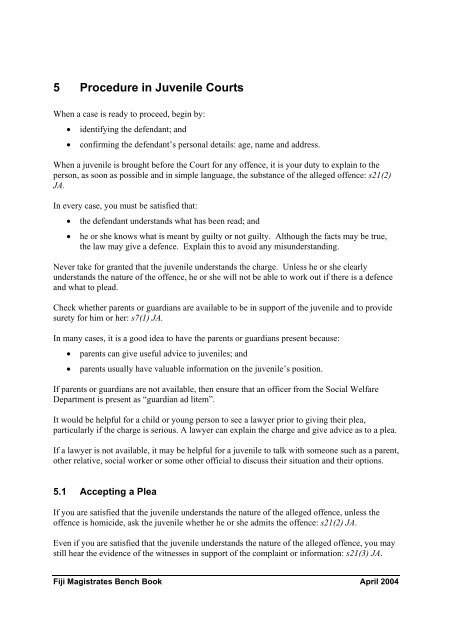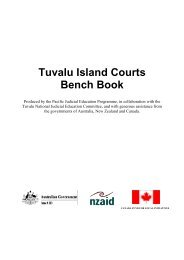Fiji Magistrates Bench Book - Federal Court of Australia
Fiji Magistrates Bench Book - Federal Court of Australia
Fiji Magistrates Bench Book - Federal Court of Australia
Create successful ePaper yourself
Turn your PDF publications into a flip-book with our unique Google optimized e-Paper software.
5 Procedure in Juvenile <strong>Court</strong>s<br />
When a case is ready to proceed, begin by:<br />
• identifying the defendant; and<br />
• confirming the defendant’s personal details: age, name and address.<br />
When a juvenile is brought before the <strong>Court</strong> for any <strong>of</strong>fence, it is your duty to explain to the<br />
person, as soon as possible and in simple language, the substance <strong>of</strong> the alleged <strong>of</strong>fence: s21(2)<br />
JA.<br />
In every case, you must be satisfied that:<br />
• the defendant understands what has been read; and<br />
• he or she knows what is meant by guilty or not guilty. Although the facts may be true,<br />
the law may give a defence. Explain this to avoid any misunderstanding.<br />
Never take for granted that the juvenile understands the charge. Unless he or she clearly<br />
understands the nature <strong>of</strong> the <strong>of</strong>fence, he or she will not be able to work out if there is a defence<br />
and what to plead.<br />
Check whether parents or guardians are available to be in support <strong>of</strong> the juvenile and to provide<br />
surety for him or her: s7(1) JA.<br />
In many cases, it is a good idea to have the parents or guardians present because:<br />
• parents can give useful advice to juveniles; and<br />
• parents usually have valuable information on the juvenile’s position.<br />
If parents or guardians are not available, then ensure that an <strong>of</strong>ficer from the Social Welfare<br />
Department is present as “guardian ad litem”.<br />
It would be helpful for a child or young person to see a lawyer prior to giving their plea,<br />
particularly if the charge is serious. A lawyer can explain the charge and give advice as to a plea.<br />
If a lawyer is not available, it may be helpful for a juvenile to talk with someone such as a parent,<br />
other relative, social worker or some other <strong>of</strong>ficial to discuss their situation and their options.<br />
5.1 Accepting a Plea<br />
If you are satisfied that the juvenile understands the nature <strong>of</strong> the alleged <strong>of</strong>fence, unless the<br />
<strong>of</strong>fence is homicide, ask the juvenile whether he or she admits the <strong>of</strong>fence: s21(2) JA.<br />
Even if you are satisfied that the juvenile understands the nature <strong>of</strong> the alleged <strong>of</strong>fence, you may<br />
still hear the evidence <strong>of</strong> the witnesses in support <strong>of</strong> the complaint or information: s21(3) JA.<br />
<strong>Fiji</strong> <strong>Magistrates</strong> <strong>Bench</strong> <strong>Book</strong> April 2004
















